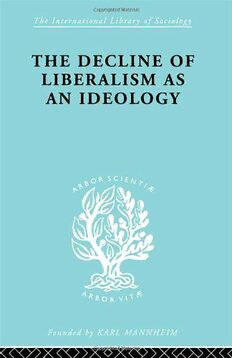
Political Sociology: The Decline of Liberalism as an Ideology PDF
Preview Political Sociology: The Decline of Liberalism as an Ideology
The International Library of Sociology THE DECLINE OF LIBERALISM AS AN IDEOLOGY Founded by KARL MANNHEIM The International Library of Sociology POLITICAL SOCIOLOGY In 18 Volumes I The American Science of Politics Crick II The Analysis of Political Behaviour Lasswell III The Analysis of Political Systems Verney IV Central European Democracy and its Background Schlesinger V The Decline of Liberalism as an Ideology Hallowell VI Democracy and Dictatorship Barbu VII Dictatorship and Political Police Bramstedt VIII Federalism in Central and Eastern Europe Schlesinger IX History of Socialism Laidler X How People Vote Benney et al XI The Logic of Liberty Polanyi XII Pacifism Martin XIII Patterns of Peacemaking Thomson et al XIV Plan for Reconstruction Hutt XV Politics of Influence Wootton XVI Politics of Mass Society Kornhauser XVII Power and Society Lasswell et al XVIII Process of Independence Mansur THE DECLINE OF LIBERALISM AS AN IDEOLOGY With Particular Reference to German Politico-Legal Thought by JOHN H. HALLOWELL R O U T L E D G E First published in 1946 by Routledge, Trench, Trubner & Co., Ltd Reprinted in 1998, 1999, 2001, 2002 by Routledge 2 Park Square, Milton Park, Abingdon, Oxon, OX14 4RN Transferred to Digital Printing 2007 Routledge is an imprint of the Taylor & Francis Group © 1946 John H. Hallowell All rights reserved. No part of this book may be reprinted or reproduced or utilized in any form or by any electronic, mechanical, or other means, now known or hereafter invented, including photocopying and recording, or in any information storage or retrieval system, without permission in writing from the publishers. The publishers have made every effort to contact authors/copyright holders of the works reprinted in The International Library of Sociology. This has not been possible in every case, however, and we would welcome correspondence from those individuals/companies we have been unable to trace. British Library Cataloguing in Publication Data A CIP catalogue record for this book is available from the British Library The Decline of Liberalism as an Ideology ISBN 0-415-17540-2 Political Sociology: 18 Volumes ISBN 0-415-17820-7 The International Library of Sociology: 274 Volumes ISBN 0-415-17838-X Publisher's Note The publisher has gone to great lengths to ensure the quality of this reprint but points out that some imperfections in the original may be apparent PATRI DILECTO FILIUS GRATUS What the notions of "form" and "harmony" were to Plato, that the notions of "individuality" and "competition" were to the nineteenth century. God had placed his bow in the skies as a symbol; and the strip of colours, rightly read, spelt "com- petition." The prize to be competed for was "life." Unsuccessful competitors died; and thus, by a beautiful provision of nature, ceased from constituting a social problem. —A. N. WHITEHEAD, Adventures of Ideas. CONTENTS CHAP. PAGE PREFACE ix I. INTEGRAL LIBERALISM AND THE PROCESS OF FORMALIZATION I II. INTEGRAL LIBERALISM 21 III. THE INFLUENCE OF HISTORICISM AND POSITIVISM UPON ORIGINAL LIBERAL CONCEPTS 5 1 IV. FORMAL LIBERALISM 70 V. BEYOND GOOD AND EVIL 87 VI. FROM NIHILISM TO TYRANNY 107 NOTES 122 BIBLIOGRAPHY 135 INDEX 139 vii PREFACE With the rise to power of the National Socialists in Germany liberal political institutions collapsed like a house of cards tumbled over by a gust of wind. The rapidity and completeness with which liberal institutions were destroyed suggested that the spirit in which these institutions were originally conceived had reached a heretofore unsuspected stage of inner degeneracy. For no nation, however severely beaten into submission, however cleverly seduced by the winning wiles of a master propagandist, would calmly submit, without resistance or civil war, to the wanton destruction of political institutions if these were securely and deeply rooted in the spiritual consciousness of the people. That it was possible expeditiously to annihilate liberal institutions without more than a murmur of dissent is eloquent testimony to the degeneracy of German postwar liberalism. How was it possible for prominent professors, judges, lawyers, and civil servants, who before 1933 were professed liberals, to accept, and some even to acclaim, a despotism that not only repudiates the fundamental postulates of liberalism but seeks actively to banish every liberal institution from the face of the earth ? It is the purpose of this study to suggest a possible answer. In 1837, when a Hanoverian government abrogated a constitu- tion it had sworn to uphold, that act met with vigorous popular protest, a protest that found intellectual expression in the now famous statement drafted by seven Güttingen professors. But in 1933 those German intellectuals who did protest against despotism were conspicuous because they were comparatively few. In 1933 there was no Dahlmann to ask, as he did in 1837, "Must I teach henceforward that the supreme principle of the State is that whatever pleases those in power is law ? As a man of honour, I would cease to teach rather than sell to my audience for truth that which is a lie and a deceit." That there was no organized collective resistance in 1933 such as there was in 1837 suggests, not that the German intellectual of the twentieth century was any less brave or vocal than the intellectual of a century before, but rather that his liberal convictions were less securely and deeply rooted. In view of this the suspicion arises that liberalism was not murdered, as is often said, but that it committed suicide. The ix
